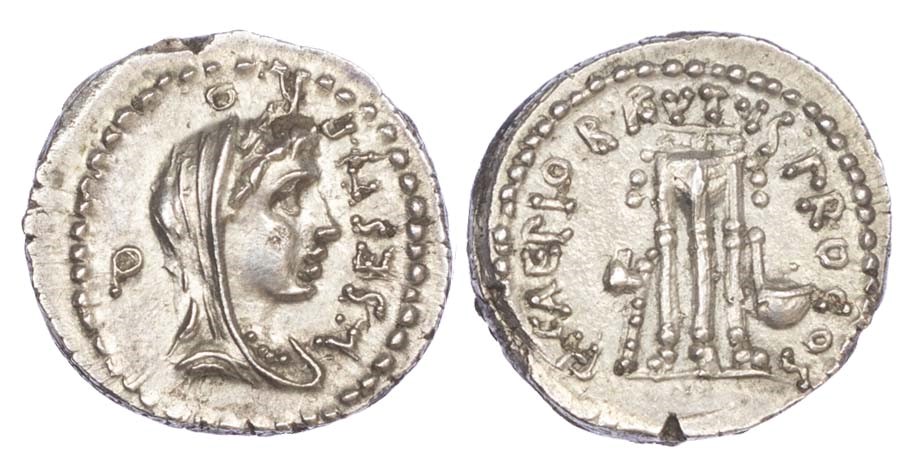This arose out of another Qatar National Library Writing Circle challenge: to write a story about an object.
For a long time, I have wanted to write about the silver denarius minted by Lucius Sestius Quirinalis in Asia, and last year we were fortunate enough to track down a beautiful example of this coin.

Minted spring-early summer 42 BC, from a military travelling mint in Asia Minor
Obverse: head of Liberty, L SESTI PRO Q. Reverse: tripod, axe and ritual ladle, Q CAEPIO BRVTVS PROCOS.
The Coin
Myrina, coast of Asia Minor, Aprilis 42 BCE
Lucius leaves the damp cool dawn and ducks into a leather tent which is, since yesterday evening, the mint. Inside it is dark and just a bit too warm.
“What do you expect?” says Faber. “The boys next door have been making flans all night.”
The tent is rigged alongside the forge which Lucius commandeered the day before. The small seaside town of Myrina will be without nails and cooking utensils for the next month, but it also has the honour of seeing a brand-new coin minted. Lucius knows that none of his new denarii will stay in Myrina: every single sliver of precious silver will make its way out on the southward march to Smyrna, safe in the legionary strong-boxes, or jingling in kitbags and money-pouches along the coast road. Lucius daren’t let his thoughts stray beyond Smyrna, or he will start thinking about Rome and the two years he has been away.
Faber is looking at him, so Lucius quickly says, “Flans?”
“Coin blanks,” says Faber. “One of the squaddies knows how to make the moulds, so he and his mates have been busy.”
“Any accidents?” asks Lucius. The squaddies are all volunteers and while they are willing none have any experience in metal working. Faber has had to take them through the basics very quickly.
Faber smiles. “Not a single burn as yet,” he says smugly. “That optio has got them all sorted. You chose a good man there.”
Lucius can’t remember the optio’s name, but he agrees. The man made it clear that this should be a good point against his name when there is a promotion going, and Lucius has already secured him his own century – once this coin has been made. They have a month at Myrina to make as many denarii as they can, or until the silver runs out.
“Anyway, never mind them,” says Faber. “How do you fancy seeing the first of your coins made then?”
“You’re ready?” Lucius looks at the table more closely and yes, there is a difference. Yesterday, there was the block of wood at the end, which Faber was going to use as the base when the hammering started: today, the wood has a short, thick, iron rod set firmly in the middle and Lucius moves across to peer at the top of the iron. Sure enough, there is a circle set into the iron, a bronze circle with a female head clearly engraved upon it. Next to the wooden block a row of metal tools lines up: hammer, tongs, and another iron rod. Lucius picks this up and peers at the picture which he knows so well: the instruments of sacrifice. The two sides of his coin are ready, carved by Faber and set into dies which will be hammered until they impart the design onto clean silver faces.
A rhythmic metallic sound alerts him to the entry of a young soldier carrying a basket full of shifting, clinking silver flans, the coin blanks fresh from the forge. The boy looks tired, and he and his tunic are both in need of a good wash.
“Just put them down here,” says Faber, and points at the ground next to the table. And as the soldier obeys, Faber says, “Stay a moment and watch.”
The soldier darts a quick surprised look at Lucius and says, “Sir?”
“As the master coiner says, soldier.”
Lucius is aware of the young man breathing a little too heavily and smelling of sweat and hot metal at his shoulder as they move forward to the table and wait, while Faber draws up a stool and checks that everything is in precisely the right place. He takes up a small pair of tongs and a hammer, winks at Lucius and in a moment has picked up a blank and laid it on the lower die. The upper die goes over the blank, the hammer swings down. In a moment it is done. Faber picks up a brand-new denarius, examines it back and front and passes it to Lucius.
“Congratulations, Quaestor,” he says, the words formal but the face smiling broadly.
And Lucius sees his own name and rank inscribed over the head of the goddess of Liberty. He stands and gazes, while somewhere in the distance he hears Faber telling him that he can keep that one. In the periphery of his vision there is a blur of hands and hammer while Faber makes another coin.
Lucius knows that this name, this title – is him. It is official, and there it is on a coin, so it must be true. Amazing and true. Then he realises that the soldier is asking him something. The question is asked against the background of clinks and taps from Faber.
“May I see the coin, sir?”
Lucius stares then laughs. This is not just his coin after all. He passes over the precious denarius before he has even studied the other side, and watches huge dirty hands turn it over while young soldier peers at it. It is so small, Lucius marvels, and tells himself to start thinking a little more coolly. He sounds like a grandmother cooing over a baby.
“The lady is the goddess Liberty, right sir?” the soldier is asking. “And I can see there is a tripod on the other side…” His voice trails away. He is frowning as he deciphers the picture. There is indeed a tripod, and an axe and a ritual ladle, and around the edge is engraved the name of the world’s most famous assassin.
“Liberty on one side and sacrifice on the other, soldier,” said Lucius and leaves the young man to work out the symbolism for himself.
He watches as the soldier mutters the letters on both sides. The young face brightens, and Lucius is impressed: not all soldiers are literate.
“So, your name is on this side with the goddess and the general is on the other,” says the soldier pleased with himself. “He is with the sacrificial things because he sacrificed Caesar and you are on the side of Liberty.”
Lucius hears the rhythm of Faber’s tapping falter and stop, and Faber whistles out a breath rather too noisily; the soldier looks up. His young face flushes and he holds out the coin.
“Sorry sir, I didn’t mean anything.”
“Nothing to worry about, soldier,” says Lucius. “That is exactly what the coin is saying.” He turns back to Faber.
“Is everything up to standard?”
Faber goes back to his usual brisk self.
“I’ll do a batch of fifty and then go through them, checking. Then we get into production properly.”
Faber looks at the soldier. “Fancy getting trained to make these, lad?”
The soldier shakes his head. “I’ll stick with making the flans if that’s all right with you sir. Nice and straightforward.”
Faber laughs, and shakes his head. Lucius dismisses the soldier, and turns back to Faber, turning his denarius over and over in his fingers, marvelling at its newness. Faber looks at him, grins and keeps on hammering, coin after coin slipping out from between the dies, tumbling to join the slowly growing heap. Lucius watches, the rhythm of manufacture lulling him until all he sees is a silver stream. It is Faber who breaks the spell by saying, “That’s funny.”
He points at the heap of coins, shuffling through them gently until Lucius sees what he is being shown. Every coin has landed the same way up, a picture of sacrificial implements and a name inscribed accusingly above them – BRUTUS.

3 responses
Great scene, with a terrific ending, Fiona!
By coincidence I have a similar scene in my new novel “Governor’s Man”, with denarii being minted from stolen Mendip silver. Set in Somerset two hundred and fifty years later, at the other end of the Empire, but not a lot has changed.
And as usual, everything you read begins,””We know very little about the actual process….” So writing becomes an act of virtual experimental archaeology! Kind of.
Ah, so true! Frustrating, but does allow the writer some leeway, I suppose.